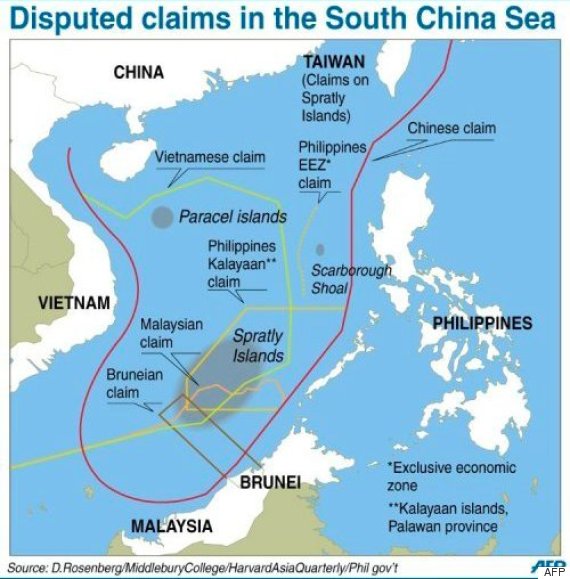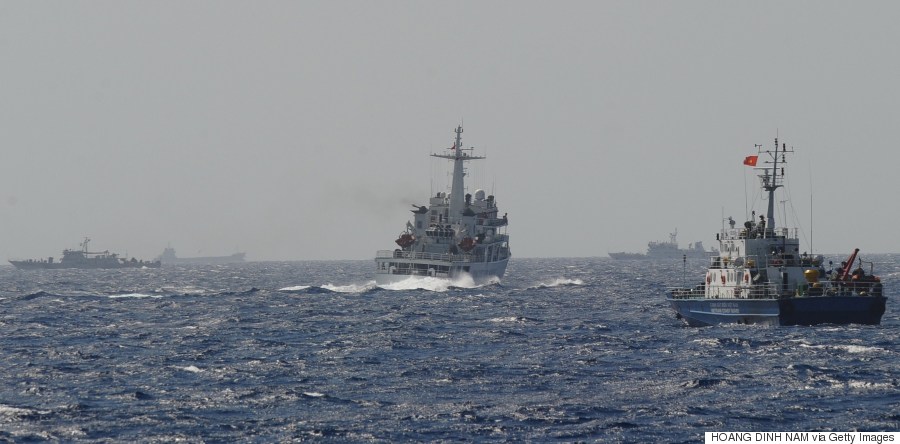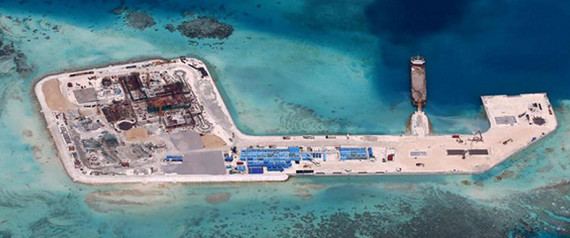Australia's Finely Balanced Role In The South China Sea Dispute
Commander of the US Pacific Air Forces, General Lori Robinson, said in Canberra on Tuesday the U.S. and its partners had to "maintain a credible combat power" with China's "militarisation" of the South China Sea, warning that China's military build-up raised the risk of sparking a miscalculated, unexpected incident.
If based in the Northern Territory, the B-1 long range bombers would be within striking distance of the hotly contested South China Sea, where China has been steadily "reclaiming" reefs and turning them into islands since 2013.
Prime Minister Malcolm Turnbull has refused be drawn on the bomber talks this week, but he told reporters it was "no secret" Australia had a close security relationship with the U.S.
But China is also Australia's Australia’s largest trading partner, with two-way trade valued at almost $153 billion in 2014.
Everyone wants to swim in the South China Sea
A rich fishing ground suspected to hold significant reserves of undiscovered oil and gas, the waters also serve as a major passageway for a large proportion of the world’s commercial merchant shipping, estimated to be worth US$5 trillion ($7.4 trillion).
Patches of the sea have been claimed by surrounding countries for centuries, and currently four -- Brunei, Malaysia, the Philippines and Vietnam -- have unresolved claims to the region.

A map showing the disputed claims in the South China Sea
China has made the largest claim to the sea since 1947, based on disputed historical evidence, and extended that claim in 2014 with a new map that took in most of the South China Sea and Taiwan.
Not everyone is taking it lying down


Imagery of the nearly completed construction within the Fiery Cross Reef located in the South China Sea, September 2015
Things became very heated in 2014 when China began drilling operations near the Parcel Islands, a move that caused large scale protests in Vietnam and coincided with similar tensions with the Philippines.

A Chinese coast guard vessel followed by a Vietnamese coast guard ship near the area of China's oil drilling rig in disputed waters in the South China Sea on May 14, 2014.
Vietnam has as recently as last month pressed China to move its Haiyang Shiyou 981 oil rig from overlapping waters.
The U.S. has been steadily running freedom of navigation exercises in the area and has been encouraging other nations to do the same.
Last month it was confirmed that Chinese forces deployed surface-to-air missiles on the tiny Woody Island in the South China Sea.
The U.S. recently sent the nuclear-powered aircraft carrier USS John C. Stennis and a group of warships to the South China Sea, a move downplayed by a US Pacific Fleet spokesman who said U.S. ships and planes routinely operate in the region.
"In 2015 alone, Pacific Fleet ships sailed about 700 combined days in the South China Sea," he said.
Last month Taiwan -- which China considers to be a wayward province -- took the rare step of commenting on the military buildup, with the nation's defence ministry cautioning "interested parties" to refrain from taking unilateral, tension-increasingmeasures in the area.
So, why should we care?
Australia released its Defence White Paper last month, a document that sets out broad planning for the military for the next 20-or-so years, with a focus on the changing nature of regional security and China's economic and military rise, as well as an increased U.S. focus on the Asia-Pacific.
Carefully worded to not present China as a direct military threat to Australia, the White Paper does oppose the reclamation and militarisation of land in the South China Sea.
But it isn't confrontational or containment driven, Professor Rory Medcalf, Head of College at the National Security College, told The Huffington Post Australia.
"It's realistic. It recognises that whatever Australia does in the region is going to have to be in the context of partnerships, including the U.S. alliance, but Asian partnerships as well," he said.
"It includes notes of reasonable, or reasoned, concern about the uncertainty China is causing in the regional strategic environment."
Some quarters in China took issue with the South China Sea stance, and accused Australia of maintaining a "Cold War mentality" with its alliance with the United States, and said it "firmly opposed to the accusations against China's construction activities on the islands and reefs in the South China Sea".
"We urge the Australian side to cherish the hard-won good momentum of development in bilateral relations, and don't take part in or conduct any activities that may compromise the stability in the region," Defence Ministry spokesman Colonel Wu Qian said.
At about the same time the U.S. general said her government was in talks with Australia to rotate bombers through Darwin, China's foreign minister Foreign minister Wang Yi, took a harder line on the country's claims to virtually all the South China Sea.
Yi told reporters in Beijing will not permit other nations to infringe on what it considers its sovereign rights in the strategically vital area.
He said China's development in the region was defensive and accused other nations of being militaristic.


The Subi Reef as it was in 2013 and 2015.
Where does this leave us?
Defence Minister Marise Payne has been adamant Australia will continue to reserve its right to exercise freedom of navigation and freedom of overflight in accordance with international law, but that Australia wants a code of conduct for the area.
Labor Senator Stephen Conroy has said Australia should send warships within 12 nautical miles of the contested islands, a move rejected by former Labor Foreign Minister Bob Carr.
Greens defence spokesman Senator Peter Whish-Wilson said U.S. bomber bases could put Australia at risk in a future regional conflict, and at risk of engaging in a regional arms race.
Policy expert Medcalf told HuffPost Australia while there's no realistic option to reverse China's build up of islands.
"The best we can hope for is neutralising the gains that China is making. If China is trying to create an acceptance of its authority in what is actually contested territory or even international waters, basically not to concede that authority to China.
"The best that can be hoped is to carry on with business as usual - which means freedom of navigation activities, it means over flights, it means not seeking permission or notifying China of movement through the South China Sea. Not Just Australia doing this, but all countries in the region acting in concert.
No one in Australia or the U.S. wants to unnecessarily provoke China, the Director the Lowy Institute's International Security Program, Dr Euan Graham, told the ABC this week.
"We in an alliance with the U.S., so in that sense, yes, our bread is well and truly buttered in the security stakes.
"China has acted extremely assertively in the past few years and I think more than the capability the B-1 will bring as an aircraft, the most important aspect of this is the signal it sends of the US and it's allies becoming more joined up."

No comments:
Post a Comment
Comments always welcome!